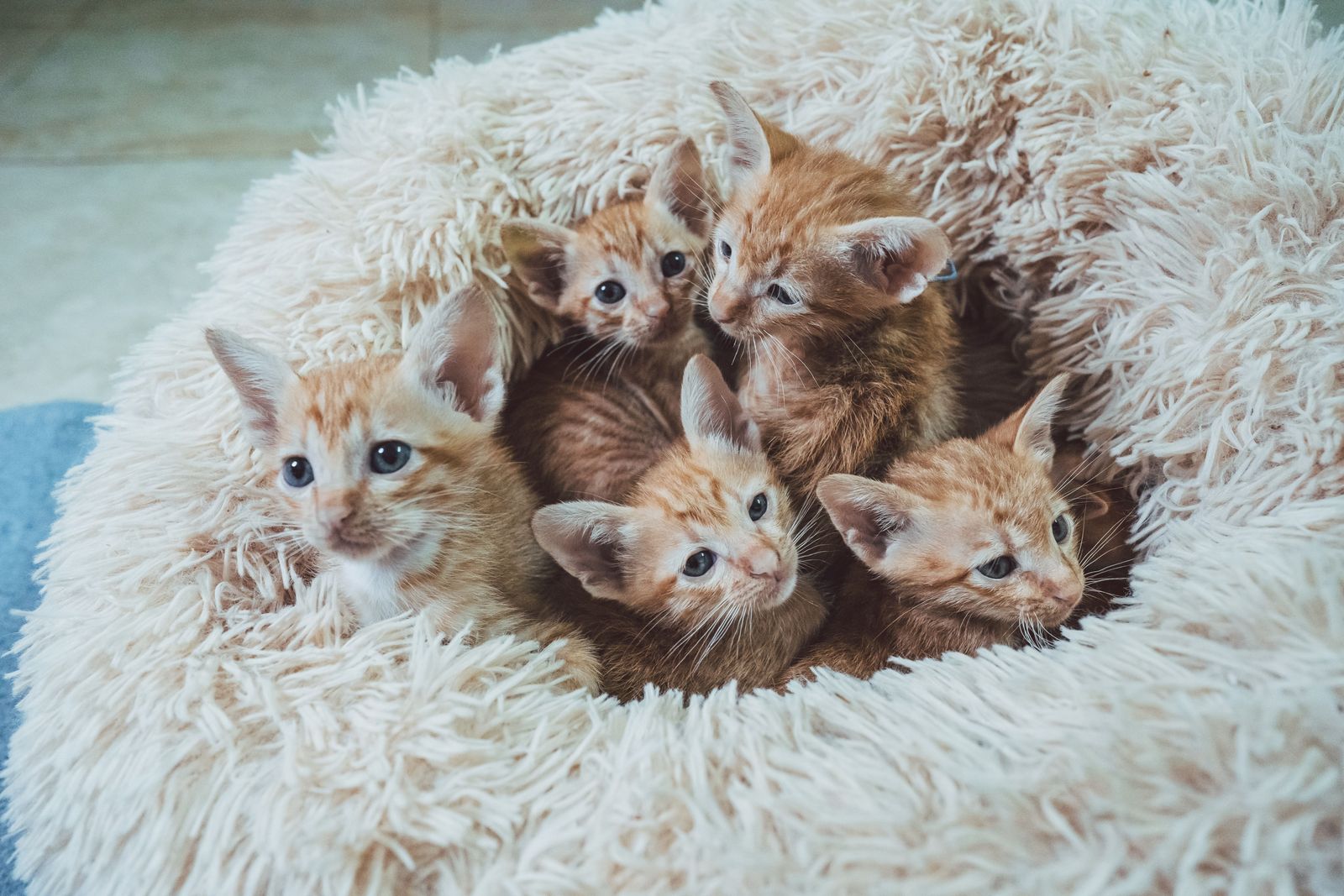What to do if you find kittens

Nothing warms an animal lover’s heart more than the sight of a brood of tiny kittens! But if you come across a litter without their mother, pause before assuming you should intervene or try to “rescue” them. Even if you’re excited about your discovery and want to help, they usually don't need or want your intervention.
We chatted with Vetster veterinarian Dr. Jo Myers for her advice on what to do if you discover stray kittens, and how to best care for them.
Find stray kittens? What to do — and what not to do:
If you find a litter of kittens, how long should you wait for the mother cat to return?
Most of the time, mother cats do not abandon their babies. If you find a litter of kittens, leave them be and don’t come back for 24 hours. The mother cat is likely just out of sight, and chances are she doesn’t think it's safe to come around if you’re there. If you still want to check on them, try to interfere as little as possible, and leave no sign of your visit. Consider sprinkling a bit of flour around the nest and look for paw prints the next day or, if possible, install a remote camera as long as it goes unnoticed.
If the kittens appear to be calm, comfortable, and content when you check on them after 24 hours have passed, you can assume they’re being cared for by their mother.
How can you tell if stray kittens have truly been abandoned?
If the litter of kittens has truly been abandoned, the kittens will show signs of distress, like crying and trying to move around. They may also look skinny, pale, dehydrated, have cold symptoms, or notice signs of diarrhea. In the very unusual case of injured stray kittens, the injury will likely be very apparent. No matter what, avoid handling them — for your sake as well as theirs. There’s always the risk of spreading sickness from animals to people, or bringing diseases and parasites home to your pets.
If you don’t think the mother cat is coming back, what should the next step be?
If you’re sure you've discovered a litter of abandoned kittens, get in touch with your local shelter or humane society. Bottle-feeding is always a last resort, and they’ll have a network of people with bottle-feeding experience.
Consider posting flyers, talking to neighbours, or sharing in local Facebook groups in case someone knows the mother. It’s best not to assume the risks of handling the kittens yourself or removing them from the nest. Leave that to the professionals.
What kind of environment should you make for stray kittens if you have to bring them indoors?
Avoid bringing stray kittens into your household, especially if you live with other cats, children, or elderly or immunocompromised people. Only bring them in when you have no other option, and when it’s absolutely necessary to save their lives.
Keep them in one room away from all other pets, and use a small box with a towel that can be removed for cleaning. A small carrier may also be helpful if they’re old enough to climb out of a box - just make sure there aren’t any holes or gaps for a curious kitten to get stuck. Handle the kittens as little as possible (and limit them to one member of your household) until you can get them checked out by a vet.
What should you feed stray kittens?
Any kitten whose eyes are still closed will require bottle feeding. It’s best to contact a shelter or vet and leave this to someone who’s done it many times, as it’s a difficult and often emotional process.
If the kitten is older, it may be able to lap liquids from a small shallow bowl — stick to kitten milk, which is specifically formulated for kittens, or goat's milk as an alternative. You can then try offering canned kitten food or dry kitten food that’s been soaked in water or kitten milk. If the kitten is physically able to eat this, you can let it continue. Don’t give cow's milk or other human-grade dairy or non-dairy options, as kittens (and cats generally) are lactose intolerant. And always keep a close eye out for diarrhea, and seek immediate veterinary attention if it develops.
What if you want to keep the kittens? What if you don’t want to keep them?
If the kittens are young and haven’t been weaned, it’s not in their best interest for you to keep them unless you’re experienced with bottle-feeding kittens. Try seeking out a foster arrangement and expressing your desire to adopt them when they’re old enough.
If you’ve found an older stray kitten that’s already weaned, make sure someone isn't already looking for it. Post signs and use social media to let people know when and where you found the kitten, and take it to your local veterinary clinic, Humane Society, or shelter to have it scanned for a microchip. In many areas, the shelter will release a kitten for adoption if no one has claimed it after two weeks.
If you aren’t going to keep the kittens, a shelter or Humane Society is still your best bet, giving any potential owner the chance to come forward and be reunited with their kitten before it’s placed in a new home. Turning over any stray kittens to a shelter is also the best way to get them started on any preventive healthcare needs they may have.
If you do decide to go ahead and take in the kitten, consider if you’re ready — financially, emotionally, and with the right food and care items a kitten will need.
If you decide to adopt a stray kitten, how should you introduce it to other pets in your household?
It’s important to keep the kitten isolated from other pets for a minimum of two weeks, and to minimize the number of people handling it. Confine your new arrival to a small area like a bathroom or laundry room — this helps with litter box training in particular. Then, once you’ve had your new kitten screened and vaccinated by a veterinarian, you can start gradually introducing your new kitten to other pets with short, supervised visits. Never force any type of interaction: allow the pets to approach each other, and make sure they have the option to leave. Be sure that existing household pets have kitten-free “safe havens” they can retreat to. After a few months, your old and new pets will sort out their social structure together.
If you’ve found a litter of stray kittens yourself and have any concerns or questions, our team of Vetster veterinarians is available to help anytime, day or night.










